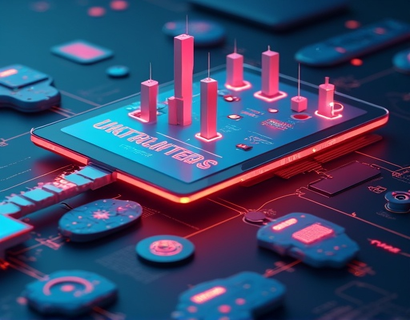Maximizing Digital Transformation with AI and Crypto: A Guide for Early Adopters and Tech Innovators
The intersection of Artificial Intelligence (AI) and cryptocurrency represents a frontier of digital transformation, offering unprecedented opportunities for early adopters and tech innovators. This article delves into the advanced integration of these technologies, focusing on how they can enhance security, efficiency, and innovation. By exploring the synergies between AI and crypto, we aim to provide a comprehensive guide for those looking to elevate their online presence and thrive in the rapidly evolving digital world.
Understanding the Synergy Between AI and Crypto
The combination of AI and cryptocurrency is not merely a technological curiosity but a powerful force reshaping the digital landscape. AI brings intelligence, automation, and predictive capabilities, while cryptocurrency offers decentralization, security, and new economic models. Together, they create a synergy that can revolutionize industries ranging from finance to healthcare, and from supply chain management to content creation.
AI's role in the crypto ecosystem is multifaceted. It enhances trading strategies through advanced analytics and predictive modeling, improves security with smart contracts and anomaly detection, and optimizes blockchain performance. Conversely, cryptocurrency provides a robust and secure medium for AI applications, enabling decentralized data storage, transparent transactions, and new forms of value exchange.
Enhancing Security with AI and Crypto
Security is a paramount concern in both AI and cryptocurrency domains. The integration of these technologies can significantly bolster security measures, protecting sensitive data and ensuring the integrity of digital transactions.
AI-driven security solutions leverage machine learning algorithms to detect and mitigate threats in real-time. These systems can analyze vast amounts of data to identify patterns indicative of cyber attacks, enabling proactive defense mechanisms. In the context of cryptocurrency, AI can enhance the security of smart contracts by identifying vulnerabilities and ensuring compliance with predefined rules.
Cryptography, a cornerstone of blockchain technology, benefits from AI through advanced encryption methods and key management systems. AI can generate complex cryptographic keys and manage them securely, reducing the risk of breaches. Additionally, AI-powered identity verification systems can provide robust authentication mechanisms, ensuring that only authorized users access sensitive information.
Boosting Efficiency Through AI and Crypto Integration
Efficiency is another area where AI and cryptocurrency intersect to create significant value. By automating repetitive tasks and optimizing processes, AI can streamline operations, reduce costs, and increase productivity.
In the realm of cryptocurrency, AI can optimize blockchain networks by managing resource allocation, reducing latency, and improving transaction throughput. For instance, AI algorithms can predict network congestion and dynamically adjust parameters to maintain smooth operations. This is particularly crucial for decentralized applications (dApps) that require high performance and reliability.
Smart contracts, powered by AI, can automate complex business processes, from supply chain management to financial transactions. These self-executing contracts with the terms directly written into code can operate without intermediaries, reducing delays and enhancing efficiency. AI can further enhance smart contracts by providing predictive insights and adaptive logic, ensuring that contracts respond to changing conditions in real-time.
Fostering Innovation with AI and Crypto
Innovation is the lifeblood of the digital age, and the combination of AI and cryptocurrency is a fertile ground for groundbreaking ideas. This synergy opens up new possibilities for creating value, driving growth, and solving complex problems.
One area of innovation is decentralized finance (DeFi), where AI and cryptocurrency converge to create financial services that are accessible, transparent, and secure. AI-driven DeFi platforms can offer personalized financial advice, optimize investment portfolios, and detect fraudulent activities. These platforms leverage blockchain's decentralized nature to eliminate intermediaries, reducing costs and increasing accessibility.
Another innovative application is in the field of digital identity. AI and cryptocurrency can work together to create secure, decentralized identity systems that give individuals control over their personal data. These systems can verify identities without compromising privacy, enabling seamless and secure interactions across various digital platforms.
In the creative industry, AI-generated content combined with cryptocurrency-based reward systems can revolutionize content creation and distribution. Artists and creators can use AI to generate unique content, while cryptocurrency can provide a fair and transparent way to reward their work. This model incentivizes creativity and ensures that creators receive fair compensation for their efforts.
Practical Applications and Use Cases
To better understand the practical implications of AI and cryptocurrency integration, let's explore some real-world use cases.
Supply Chain Management: AI can optimize supply chain operations by predicting demand, managing inventory, and detecting fraud. When combined with cryptocurrency, these processes can be executed on a blockchain, ensuring transparency and immutability. For example, a company can use AI to track the origin and movement of goods, while cryptocurrency smart contracts automate payments based on predefined conditions.
Healthcare: In healthcare, AI can analyze medical data to provide diagnostic insights and personalized treatment plans. Cryptocurrency can facilitate secure and private sharing of medical records, ensuring patient data is protected while enabling seamless collaboration among healthcare providers. AI-driven platforms can also manage clinical trials and drug development processes, enhancing efficiency and reducing costs.
Finance: AI-powered trading platforms can leverage cryptocurrency markets to execute trades with high precision and speed. Smart contracts can automate complex financial transactions, such as derivatives and insurance claims, reducing the need for intermediaries and lowering transaction costs. AI can also enhance risk management by providing real-time analytics and predictive insights.
Challenges and Considerations
While the integration of AI and cryptocurrency offers numerous benefits, it also presents challenges that must be addressed. One of the primary concerns is regulatory compliance. The crypto space is still evolving, and regulations vary widely across jurisdictions. Companies must navigate these regulations carefully to ensure compliance and avoid legal issues.
Another challenge is the technical complexity of integrating AI and cryptocurrency systems. Developing robust, scalable, and secure solutions requires expertise in both domains. Organizations need to invest in skilled personnel and advanced infrastructure to overcome these technical hurdles.
Privacy is also a critical consideration. While blockchain and AI can enhance security, they also raise concerns about data privacy and surveillance. It is essential to implement privacy-preserving technologies, such as zero-knowledge proofs and homomorphic encryption, to protect user data and maintain trust.
Future Trends and Opportunities
The future of AI and cryptocurrency integration is promising, with several trends and opportunities on the horizon.
Increased Adoption: As more businesses recognize the benefits of AI and cryptocurrency, we can expect wider adoption across various industries. This will lead to the development of more sophisticated and specialized solutions.
Interoperability: Efforts to improve interoperability between different blockchain platforms and AI systems will enhance the seamless integration of these technologies. Standards and protocols that facilitate communication and data exchange will be crucial.
Sustainability: The environmental impact of cryptocurrency mining is a growing concern. AI can play a role in making crypto more sustainable by optimizing energy usage and developing more efficient consensus mechanisms.
Enhanced User Experiences: AI-driven user interfaces and personalized experiences will become more prevalent, making AI and cryptocurrency solutions more accessible and user-friendly. This will drive broader adoption and innovation.
Conclusion
The integration of AI and cryptocurrency represents a transformative force in the digital world, offering unparalleled opportunities for early adopters and tech innovators. By enhancing security, efficiency, and innovation, this synergy can elevate online presence and drive digital transformation. As the landscape continues to evolve, those who embrace these technologies will be well-positioned to thrive in the future.










































